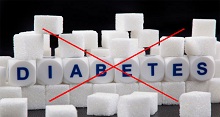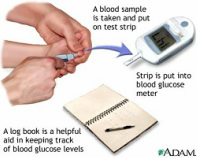
The STAND Method For Diabetes Management
The STAND method for diabetes management is for anyone who wants to take charge of their diabetes management plan and live a better life with diabetes
S - Study
T - Take charge
A - Awareness
N - Never Give Up
D - Diligence
STUDY
Begin studying all the diabetes materials that you can get your hands on. This might include books (buy them or get them from the library), diabetes magazines, newsletters, diabetes related webpages, etc... Study at your own pace and ask questions (of your doctor, nurse, Certified Diabetes Educator, other friends with diabetes, etc...)
TAKE CHARGE
This is an important aspect of the S.T.A.N.D. method. You need to tell yourself who is boss. How do you do that? It's simple, but difficult. You need to learn self-control and discipline. That might mean eating boneless chicken instead of two slices of pizza. It might mean taking your insulin injections even though you don't "feel" like doing it. This is something you work on every second of every day. Taking charge of your life and your diabetes management plan is rewarding, but it's also a battle. You may 'fight' with yourself over diabetes tasks like testing your blood sugar or going to the doctor. Fight each battle and try to win.
AWARENESS
This part of the method is two-fold. You need to stay aware of the diabetes in your life. Don't ever try to fool yourself into thinking that you're not diabetic, and that you can eat anything you want with no bad side effects. Diabetes never goes away. It may lie dormant for awhile (a
honeymoon (Type I) or being controlled with diet & exercise (Type II)) but it's always there and can return with a veagence. Managing diabetes is a 24 hour job. Sure, you'll be able to have fun in life at times, but you still have to keep managing diabetes as a high priority.
The second part of awareness is to make others around you aware that you have diabetes. You might feel this isn't possible if you think it might harm your job security or if you don't have a good support system around you (family & friends). Even if this is the case, it's still important to
let others around you know that you have diabetes. This is especially true if you take medication to help control diabetes. If you experience a low blood sugar reaction (insulin reaction) you may need someone to call 911 or give you a shot of glucagon.
NEVER GIVE UP
This part of the method is simple. Never give up. Don't ever stop trying to get keep your blood sugar levels in good shape. Don't ever stop trying to exercise. Never let yourself believe there's no hope in changing the habits you want to change.
DILIGENCE
Diabetes management is full of tasks that require diligence and dedication. A day full of sticking yourself, measuring food and jabbing yourself three times a day with a needle might not be your first choice, but it's the life of a person with diabetes. It's up to you to make doing the tasks second nature. You might not _like_ taking injections but can you find a way to make it something you _will_ do? Being diligent about your diabetes related tasks is something that must take place if you intend on seeing results. Also, remember that completing the tasks doesn't always lead to good results. Diabetes can sometimes have a mind of it's own and complications can come up at any moment, but it's up to us to still try to do things the best way we can.
GLOSSARY
honeymoon - happens to people with Type I diabetes. The diabetes becomes less severe and the person might not need insulin while the honeymoon period lasts. A honeymoon period has been known to las t up to two years.
glucagon - a hormone produced by the alpha cells in the pancreas. Glucagon releases glucose from the liver into the body which in turn raises the blood sugar of a person having a low blood sugar reaction.
Read our blog click here
The STAND method for diabetes management is for anyone who wants to take charge of their diabetes management plan and live a better life with diabetes
S - Study
T - Take charge
A - Awareness
N - Never Give Up
D - Diligence
STUDY
Begin studying all the diabetes materials that you can get your hands on. This might include books (buy them or get them from the library), diabetes magazines, newsletters, diabetes related webpages, etc... Study at your own pace and ask questions (of your doctor, nurse, Certified Diabetes Educator, other friends with diabetes, etc...)
TAKE CHARGE
This is an important aspect of the S.T.A.N.D. method. You need to tell yourself who is boss. How do you do that? It's simple, but difficult. You need to learn self-control and discipline. That might mean eating boneless chicken instead of two slices of pizza. It might mean taking your insulin injections even though you don't "feel" like doing it. This is something you work on every second of every day. Taking charge of your life and your diabetes management plan is rewarding, but it's also a battle. You may 'fight' with yourself over diabetes tasks like testing your blood sugar or going to the doctor. Fight each battle and try to win.
AWARENESS
This part of the method is two-fold. You need to stay aware of the diabetes in your life. Don't ever try to fool yourself into thinking that you're not diabetic, and that you can eat anything you want with no bad side effects. Diabetes never goes away. It may lie dormant for awhile (a
honeymoon (Type I) or being controlled with diet & exercise (Type II)) but it's always there and can return with a veagence. Managing diabetes is a 24 hour job. Sure, you'll be able to have fun in life at times, but you still have to keep managing diabetes as a high priority.
The second part of awareness is to make others around you aware that you have diabetes. You might feel this isn't possible if you think it might harm your job security or if you don't have a good support system around you (family & friends). Even if this is the case, it's still important to
let others around you know that you have diabetes. This is especially true if you take medication to help control diabetes. If you experience a low blood sugar reaction (insulin reaction) you may need someone to call 911 or give you a shot of glucagon.
NEVER GIVE UP
This part of the method is simple. Never give up. Don't ever stop trying to get keep your blood sugar levels in good shape. Don't ever stop trying to exercise. Never let yourself believe there's no hope in changing the habits you want to change.
DILIGENCE
Diabetes management is full of tasks that require diligence and dedication. A day full of sticking yourself, measuring food and jabbing yourself three times a day with a needle might not be your first choice, but it's the life of a person with diabetes. It's up to you to make doing the tasks second nature. You might not _like_ taking injections but can you find a way to make it something you _will_ do? Being diligent about your diabetes related tasks is something that must take place if you intend on seeing results. Also, remember that completing the tasks doesn't always lead to good results. Diabetes can sometimes have a mind of it's own and complications can come up at any moment, but it's up to us to still try to do things the best way we can.
GLOSSARY
honeymoon - happens to people with Type I diabetes. The diabetes becomes less severe and the person might not need insulin while the honeymoon period lasts. A honeymoon period has been known to las t up to two years.
glucagon - a hormone produced by the alpha cells in the pancreas. Glucagon releases glucose from the liver into the body which in turn raises the blood sugar of a person having a low blood sugar reaction.
Read our blog click here

 RSS Feed
RSS Feed